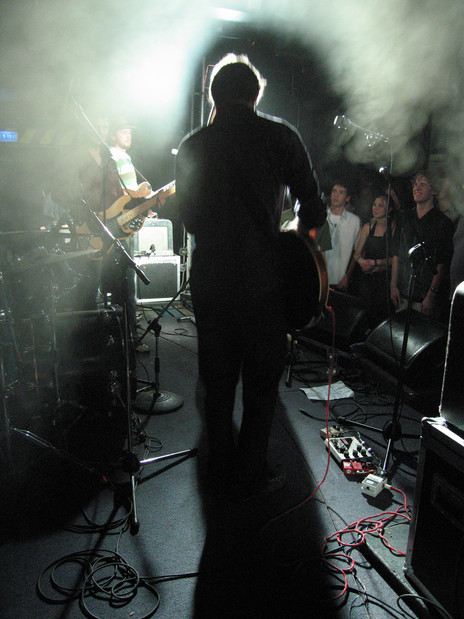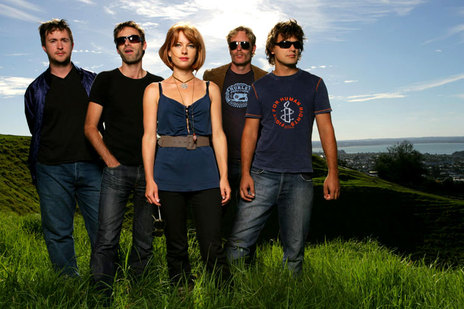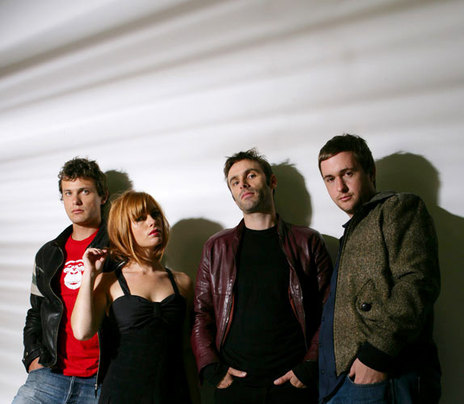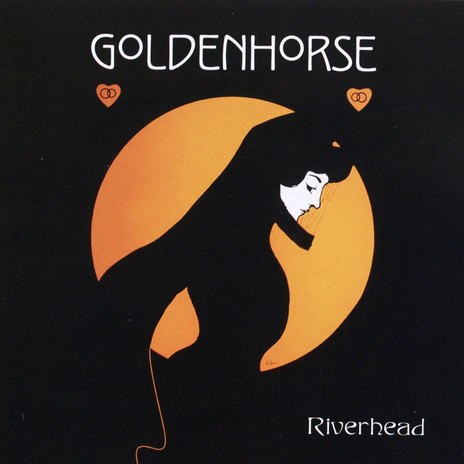Goldenhorse played all the usual traps around town, winning fans among the city’s old-guard musical elite – including Tim and Neil Finn – and wowing a growing fan base with the idea that, yes, it was okay to make pop music after all, as long as it wasn’t condescending and cravenly commercial.
In a 2002 article for Witchdoctor, written soon after the success of Goldenhorse’s first album Riverhead, Gary Steel wrote, “It’s the creative process itself and writing something ‘real’ that appeals to Goldenhorse.”
They were fronted by an opera-trained singer with a penchant for Kate Bush-like flights of fancy.
In truth, the group played a form of folk-pop familiar to those who had lived through the late 1960s flowering of the music form. Their songs were both naggingly chorus-memorable and classically folk-pop in a jangly late 1960s fashion. Except that they were fronted by an opera-trained singer with a penchant for Kate Bush-like flights of fancy, and a guitarist who grew up listening to classical recordings and never learned to read music.
But who were Goldenhorse? The group had evolved haphazardly out of the critically acclaimed Bressa Creeting Cake, with both Geoff Maddock and Joel Wilton coming from that group, and adding Kirsten Morrell and Ben King. Maddock and Morrell, an item in the early years of the group, were the leaders and main writers and singers throughout the group’s short lifetime, while other members came and went.
Their debut album – released in October 2002 and named Riverhead after the rural west Auckland area the group were living in – was a slow burning success that reaped several charting singles.
The commercial payback of Riverhead must have come as a relief to the group, who first began recording without a label, and on the band’s own dime: a bold decision made to forgo the often frustrating record label courtship. As Morrell told TVNZ’s Good Morning, “You can go down the track of doing lots of demos, and keep on trying to get a record deal, but you may as well just go ahead and make the thing you really like, you know? And then you see what happens.”
With some borrowed money (mostly from Morrell’s mother) and a lot of borrowed gear (largely from the Finn brothers in exchange for “points” off the finished album, says Morrell), they recorded the debut over the course of a year, in a stop-start nature. Although a number of studios were used, the bulk of recording was undertaken in a hand-built home studio in the Waitakere Ranges.
“A lot of the time, the house was actually enveloped in mist, which I think was another influence on the record,” Maddock told Nick Bollinger in a 2012 RNZ retrospective. “In many ways it felt like it fulfilled many fantasies you have about making a record – going there, taking your stuff, and doing it ... I didn’t know at the time it was going to take so long.”
The measured recording pace allowed the sound to naturally evolve into one which included elements not expected of a stock-standard pop album. For example, drummer Joel Wilton wasn’t satisfied following the conventional 4/4 rhymic blueprint, and his experimentation with different meters played a significant role in creating Goldenhorse’s distinctive “Posh Pop” sound.
Posher still, Riverhead boasted an ambitious string section. Maddock, who grew up with classical-buff parents, re-immersed himself in that world ahead of the recording. As he reflected to RNZ in 2012, the “totally cut up, hammered and bizarre” work of Wagner and Stravinsky inspired not only the harmonic variation of Riverhead, but also the use of cellos and violins. “I always wanted to arrange some strings, I had an idea for the record that it would be magnificent on occasion, you know? That it would be really different.”
The album finally made it to No.1 on the NZ charts in August 2004.
Nearing the end of the process, the risk of self-recording paid off, with Siren Records jumping on board. Although Riverhead’s initial impact was modest, it slowly grew in popularity through their extensive touring, additional support from distributor EMI, and a well-publicised gig with the Auckland Philharmonia Orchestra (APO).
The album finally made it to No.1 on the NZ charts in August 2004, nearly two years after its release, selling more than 50,000 copies in the process.
Singles ‘Maybe Tomorrow’, ‘Northern Lights’ and ‘Wake Up Brother’ garnered impressive radio play, and Riverhead eventually spent over 70 weeks in the album charts.
Becoming one of New Zealand’ most popular acts certainly made the recording of the follow-up album, Out of the Moon, a wildly different experience from their debut. Maddock told NZ Musician at the time, “I don’t really enjoy the industry as a whole. I don’t really enjoy being part of something termed an industry, and the whole marketing side of it, it can be really foul … it can be just totally daunting thinking about how you put your music out to this massive, roaring river of trade and expect it to stay afloat.”
Not that their newfound success didn’t come with any perks. Out of the Moon’s fast, professional recording with veteran music producer Murray Grindlay was a far cry from the long, hard slog of Riverhead. Maddock told NZ Musician, “One thing I’ve learnt is it’s better to have a budget and time limits, than no time limits and no budget!”
The years on the road and the addition of guitarist Andrew Clark fostered a new dynamic for the studio. “We have matured,” Morrell told NZ Herald, “There are only so many times you can run away from the studio screaming your head off, crying into a forest until someone comes and gets you. There’s no time for that anymore because you really have to focus on what you’re doing ...”
Out of the Moon debuted on the album charts in April 2005 at No.2 – its peak position – and went on to sell over 25,000 copies, giving it platinum status. Singles ‘Run, Run, Run’, ‘Out of the Moon’ and ‘Fish’ were supported with generous radio play and stylish music videos – another benefit of mainstream success.
The Listener’s Gordon Campbell described the album as “more cohesive than Riverhead” and praised it for capturing “far more of the sound and spirit of the band’s live performances, and it gets better as it goes along. On the last few tracks, there is far more interplay between Morrell and the rest of the band. Elsewhere, the group functions largely as just a platform for Morrell’s gorgeous voice.”
After the usual local touring circuit, Goldenhorse performed in London. “We did play a very intense gigging circuit of London twice over,” Morrell told AudioCulture in 2023, “which attracted the likes of mentioned producers, sound engineers, booking agents, managers, etc ... We were given a four out of five- star review when supporting the Magic Numbers in Time Out magazine.”
On returning home they began recording their third and final album, Reporter. Recorded in Auckland’s Roundhead Studio, they were joined by Tui award-winning sound engineer Clint Murphy and British producer Phil Vinall, known for his work with Placebo and Radiohead.
Upon Reporter’s release in 2007, Russell Baillie commented that “Out of the Moon hasn’t endured as well as their great 2002 debut Riverhead did – while the upbeat songs might have added some pace to their live set, it lacked much to remember it by. Reporter, on the other hand, sounds like one which will hold the interest. Perhaps because the band’s various balancing acts – between its three songwriters; between the willowy voice of Kirsten Morrell and the guitar band; between their Brit-influenced indie-pop default setting and their loftier musical ambitions – have worked out for the best.”
But it would seem the commercial momentum had been lost, reflected in its disappointing chart placing: while Riverhead made it to No.1, and Out Of The Moon to No.2, Reporter could only manage No.38. The group went on hiatus soon afterwards.
Although it was not publicly deemed a break up at the time, over a decade has passed without reformation, and all members have made clear signs of moving on.
Since they ceased duties, Ben King has been producing bands, playing with Greg Johnson, Tim Finn, and The Bads, and his own group Grand Rapids released its well-received first album Faintheardedness in 2011.
‘Riverhead’ has remained in the cultural consciousness as one of the nation’s great albums.
Kirsten Morrell has been involved in multiple opera productions, mostly singing in mainscale opera choruses, although she has sung a handful of solo concerts within the classical music world.
She released her first independent record Ultraviolet in 2010, which briefly nipped into the Top 40.
Ever the chameleon, Morrell moved back to Auckland to pursue a Masters in art curation and management at AUT, and she teaches yoga from time to time.
Morrell successfully landed a place in one of the UK’s leading symphonic choirs, The Crouch End Festival Chorus, and has appeared on several of their classical recordings.
Joel Wilton has also pursued a life outside the music industry, taking up the post of deputy principal at Havelock North High School – although that didn’t stop him joining the 2009 Bressa Creeting Cake reunion tour with fellow Goldenhorse alumnus Geoff Maddock.
Maddock now lives in LA where he works as a producer, and performs with Daniel and Natasha Bedingfield. He helped to write music for the play Station to Station by Michael Galvin (Chris Warner of TV’s Shortland Street), and wrote the soundtrack for Katie Wolfe’s short film This is Her.
Despite the passing years, Riverhead has remained in the cultural consciousness as one of the nation’s great albums – a status that only seems to grow over time. As Nick Bollinger reflected on the debut in his 100 Essential New Zealand Albums book: “Goldenhorse would make two more albums, though various line-up changes, including the departure of Joel Wilton, meant they would never again be the same band that made Riverhead. Nor would they ever replicate that album’s grandeur, or rarefied mysterious atmosphere.”
--
Updated by Taya Kennedy Robbins, 2019
Updated by Rosie Howells, 2020















